‘More children die from dirty water than bullets’
Every year 72,000 children under five die from illness linked to dirty water, compared with 3,400 from war-related violence
Forced to flee, Nabil struggles to protect his children from unsafe water
Conflict in their home town Taiz forced Nabil, his wife Salma, and their three children to flee to the city of Dhamar. Even in Dhamar’s relative safety, they struggled, living in inadequate housing with no stable income.
The family’s only water came from trucks, forcing them to queue for hours to collect just 20 to 30 liters—just 4-6% of the daily amount recommended by the UN.
Nabil says the water “tasted strange”. While it didn’t affect the adults, three-year-old Mohammed fell ill, suffering from vomiting, a sore throat, and diarrhea. He was diagnosed with cholera.
The family couldn’t afford to keep him at the hospital, so they took him home with intravenous fluids, syringes and medication, terrified he wouldn’t survive.
Thankfully, with quick thinking and care, Mohammed recovered. But Nabil and Salma still live in constant fear—without access to clean water, any of their children could fall dangerously ill again, and next time they may not be so lucky.
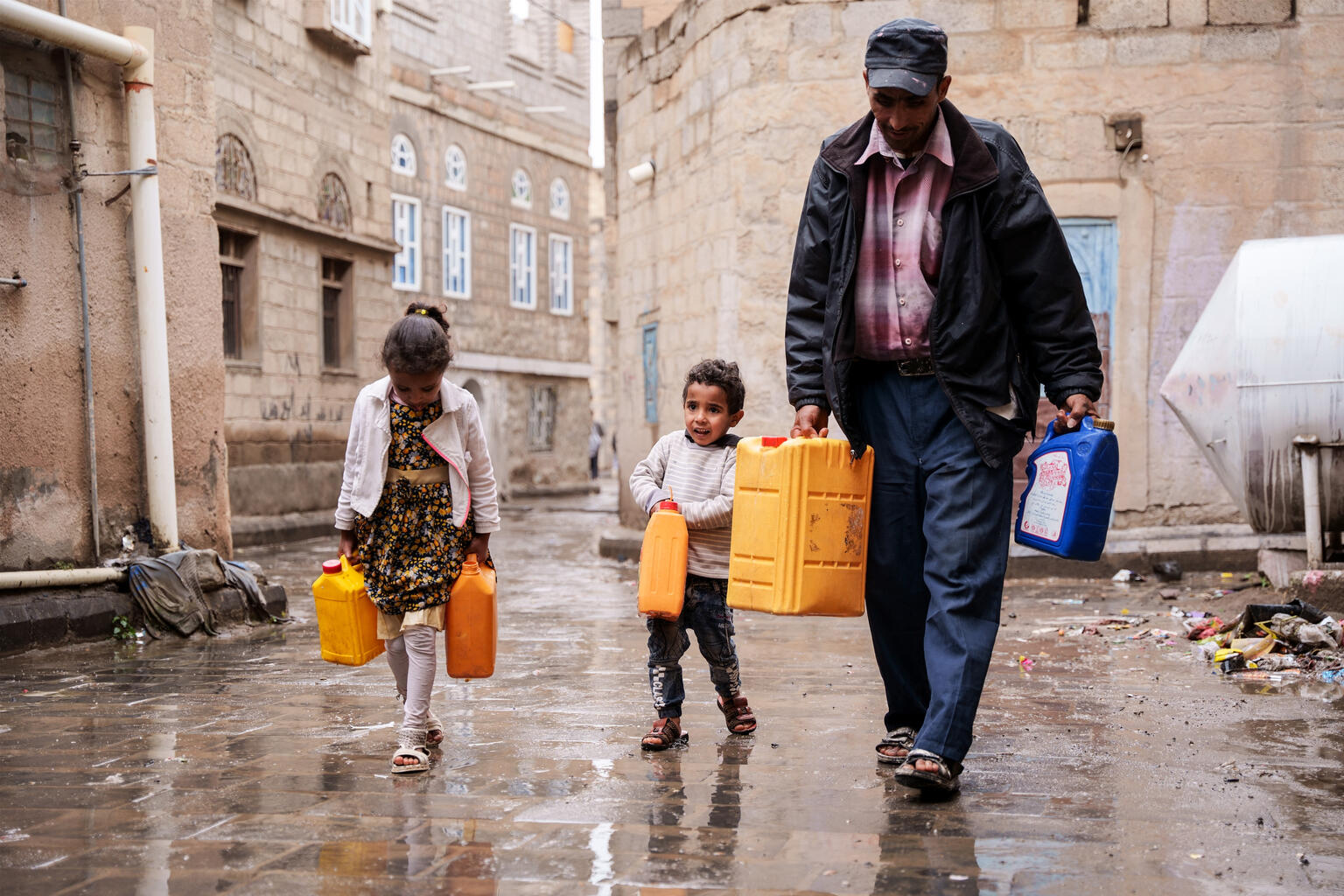
As well as deadly diseases, a lack of safe water can prevent children like Mohammed from getting an education, forcing them to drop out of school and join lengthy queues at the water tankers.
A gift to UNICEF in your Will can be the gift of clean water to children.
Meet Hasan, part of Yemen’s growing sustainable workforce
Alongside our partners, UNICEF’s $1.4 million solar-powered water project now provides safe, running water to 137,000 Dhamar residents. This initiative also fosters Yemen’s own skilled workforce.
Thanks to UNICEF’s $1.4 million solar-powered water project, 137,000 residents in Dhamar now have access to safe, running water. This initiative also fosters Yemen’s own skilled workforce.
Hasan is a 24-year-old engineer who supervises Dhamar’s huge solar-powered water system – ensuring the delivery of clean water to his community.
Hasan sees his work as providing both a humanitarian service and utilising a highly technical skill. And he hopes others in Yemen learn what he has, so the country’s reliance on outside technical assistance is reduced.
Sustaining a project like this is always complex. But this is even more true in Yemen which remains in the grip of an ongoing conflict. Yet despite the difficulty UNICEF is partnering with Yemini communities in another 149 solar water projects, reaching 2.5 million people. These projects connect clean water to schools and health centres – every aspect of community life. Moreover, at the same time they reduce consumption and reliance on fossil fuels.
“If you can save one child’s life isn’t that a lot?”
UNICEF has been committed to providing safe water to children worldwide since 1953
This work has expanded from small pilot projects to initiatives in 158 countries, improving child survival rates and the quality of life for millions, especially women and girls. Yet, as more children die from dirty water than violence, greater investment in climate-resilient water programs is urgently needed.
The importance of clean water
Access to safe water is fundamental to public health. It plays a critical role in preventing diseases and improving the overall well-being of communities.
Safe water is essential for the healthy development of children. And lack of access to it leads to waterborne diseases such as typhoid, dysentery and cholera – all among the leading causes of death in children under five.
UNICEF’s commitment to clean water initiatives is a core part of our organisational DNA and is why we now have the world’s largest clean water programme to benefit children. We will continue to invest in it as part of our goal to break the cycle of poverty and disease.
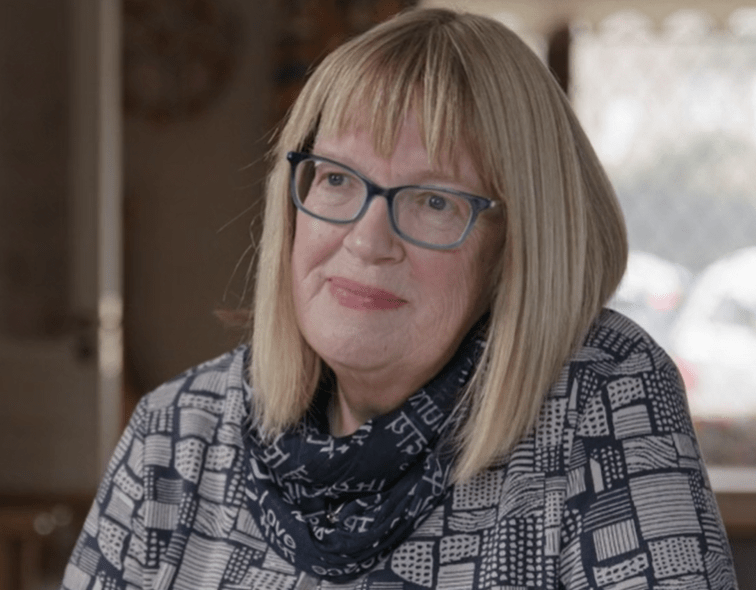
Therese Dooley, a retired UNICEF Global Advisor & WASH Specialist
71 years of helping provide clean water
To begin with, UNICEF’s clean water projects were emergency interventions providing safe water to areas suffering from drought.
By the early 1990s, UNICEF recognised the dire need for improved clean water services in developing countries.
Millions of children were dying annually from preventable diseases like diarrhoea simply because they didn’t have access to clean water. UNICEF began to work within countries to strengthen clean water systems and develop capacity.
This laid the groundwork for extensive projects focusing on sustainable and community-driven solutions. Numerous water supply projects were supported by UNICEF to provide safe drinking water to communities in need.
While today such projects may be huge, million dollar undertakings, our initial work was simpler. Boreholes were dug, wells constructed and hand pumps installed. In regions where groundwater was scarce, UNICEF promoted rainwater harvesting. And, in more mountainous areas, gravity-fed water systems to channel water down from springs higher up the slopes.
A crucial element of these initiatives is they not only provide immediate access to safe water, but they also ensure communities have long-term solutions to water scarcity.
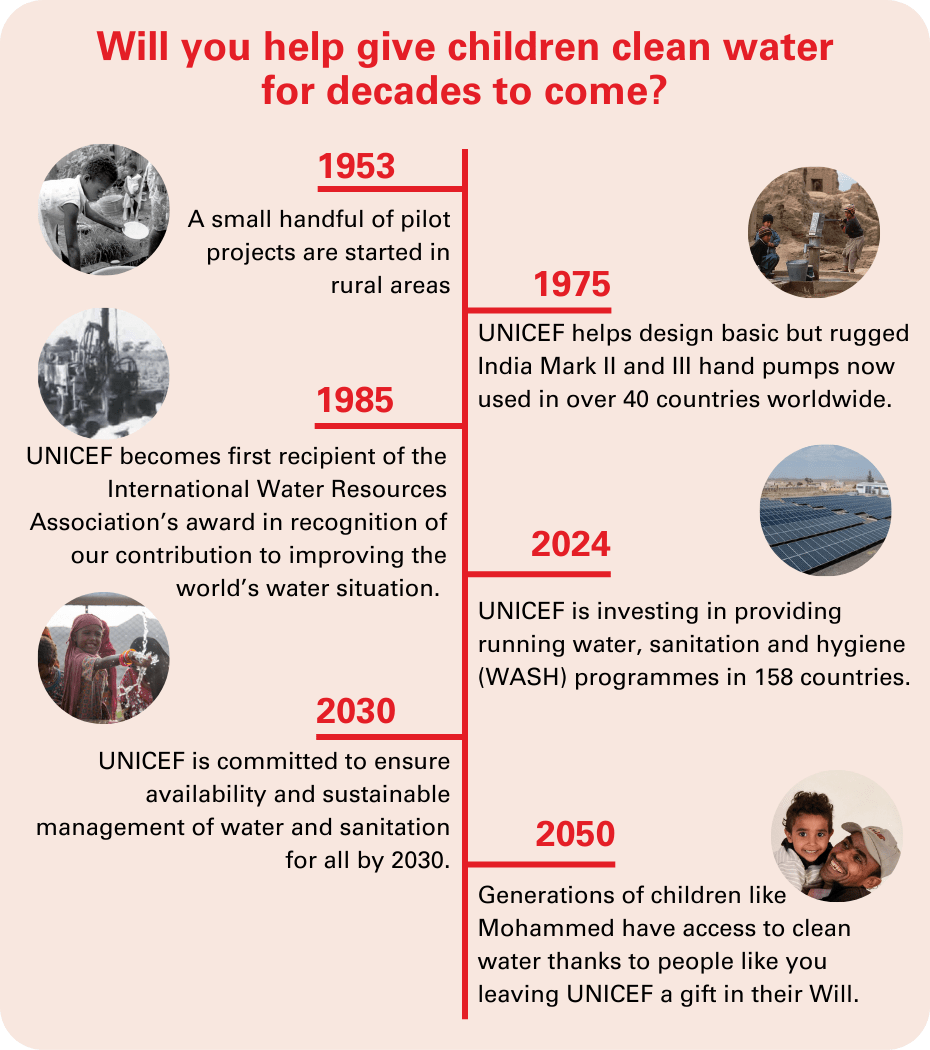
By leaving UNICEF a gift in your Will you can help fund our long term humanitarian programs, which will save generations of children for decades to come.
Successes
Thanks to supporters like you and our partners, remarkable strides have been made in delivering safe water to vulnerable children around the world. At any time UNICEF is running water, sanitation and hygiene (WASH) programmes in 158 countries. Since 2000, these have brought clean water to around 600 million children. Including those in:
✔ Libya – Rehabilitation of 5 boreholes damaged in last September’s earthquake to benefit 50,000 residents in Derna, Shahat and Albayda.
✔ Gaza – Safe water supplied to 1.6m people and 100,000 purification tablets and hygiene kits distributed.
✔ Jordan – Provision of the water supply in the Za’atari Camp where 80,000 Syrian refugees – including 44,000 children – have lived since the start of the war in Syria 13 years ago.
And between 2000-2019 overall diarrhoea deaths attributable to unsafe drinking-water and unsafe sanitation declined by approximately half. For under fives the results are even better: diarrhoea deaths dropped from 1.1 million in 2000 to 381,000 in 2019. Because of successes like these, in times of humanitarian crises, UNICEF is recognised as the world’s WASH specialist, co-ordinating the response.
For the decades to come
UNICEF’s goal is for every child to have access to safe and equitable water, sanitation and hygiene services. Here’s just three of the innovative solutions we’re using to support countries in reaching this goal:
1. Mapping deep aquifers – locating permeable, rock-containing water using satallite data improves drilling accuracy by up to 93%.
2. Managed aquifer recharge – collects and treats water from ponds and roofs (rainwater) and injects it underground for storage and future use.
3. Urban wastewater treatment – uses nature-based WASH solutions to provide sustainable, cheaper, climate-resilient wastewater treatment services.
A gift to UNICEF in your Will can help ensure every child has access to clean water today and for the decades to come
For every child, a future
Contact Pauline today about leaving a Legacy Gift in your Will
"*" indicates required fields
Download our Gifts in Will Guide
Our guide contains all the information you need to take that first step in writing your Will or to update an existing one. Request your guide today by contacting our Legacy Gifts Manager, Pauline.
I didn’t have dependents when creating my Will – UNICEF is well respected, professional and they do extremely valuable work so that was my reason.
- GoodWill Legacy Donor
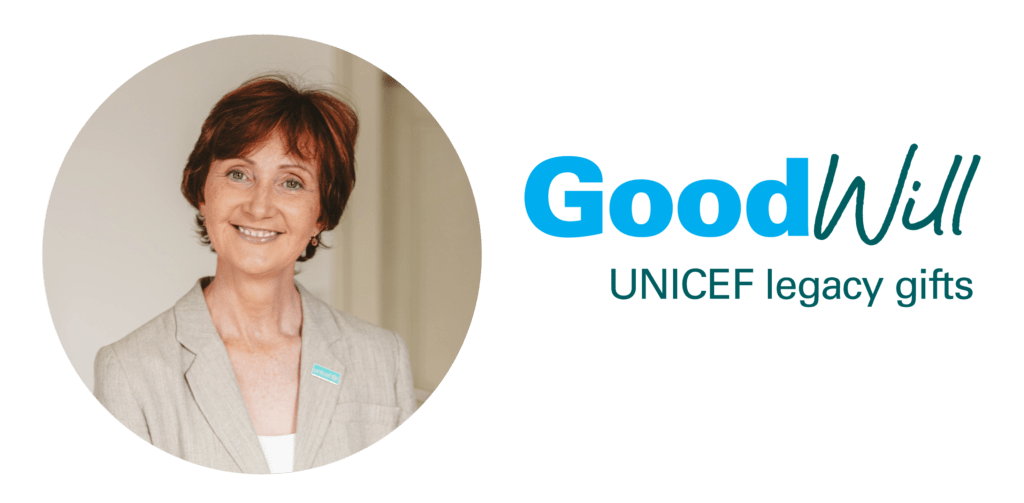
Contact Pauline to learn more
You can talk in confidence to our Legacy Gifts Manager, Pauline, who will help guide you in writing your Will and send you information on our Legacy Giving programme.
Phone: 01 878 3000
Email: pauline@unicef.ie
